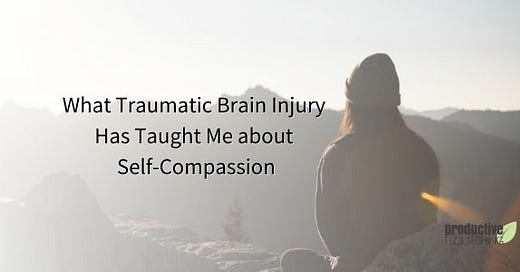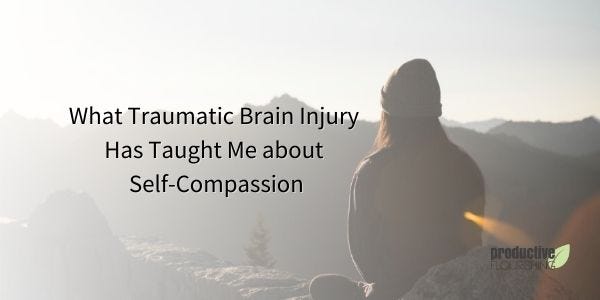What Traumatic Brain Injury Has Taught Me about Self-Compassion
Our limits can be our greatest allies.
We know statistically people forget more than they think they do. Our bias is to believe that we’re mostly on target, correct, or in the right, when it comes to our memory. We tend to value rightness and effectiveness above many other things, including compassion towards ourselves.
That’s difficult when you’re living through a traumatic brain injury (TBI), because you tend to forget. A lot.
Yet our limits can be our greatest allies. And, our hardships bear hidden blessings.
This is one of the beautiful gifts that has come to me in the course of recovery from a TBI.
We resent forgetting, or errors that suggest our brains are working as less than a fast machine. Slow processing (in fact, a whole separate function of the brain to fast processing) and forgetting are stark reminders for me of my vulnerabilities.
One of the hardest parts of healing from my TBI has been how I treat myself. Other people generally don’t criticize someone with a concussion — but I have found myself totally willing to judge myself about my difficulties and limitations.
I know I am not alone in this.
We are often our own worst critics. How many great works of art or stellar companies have not come to life because of inner critics?
The question isn’t so much our efficiency or effectiveness or skills or education or any number of other things. It’s more about if we are on our own side.
Many people don’t even start, out of a fear of imperfection or limitedness. Do you go to bat for yourself? Do you believe in yourself enough to try until you hit upon your limitations?
And, when you hit upon those limitations, do you find a way to keep going? How do we turn this around? How do we turn off the inner critic?
In Comes Compassion
We turn off criticism by turning on compassion. So, what does graceful compassion look like, especially when I’m extending it to myself?
Say I forget a thing; very likely to happen right now. ;-) What will being gracefully compassionate actually sound like in the language I use with myself, in my inner monologue?
I have had to think about what I would say to a loved one. How would I treat Charlie if he was going through this? How would I treat a teammate? That’s the language I need from my inner voice.
For as long as I can remember it has been easier for me to be less judgmental of others than of myself.
So, how do we begin that practice internally? Imagine a mirror between our external and internal realities; we have to do the inner work in order to get where we want to be (what we want to see) externally.
If you’re not in the habit of already extending grace and compassion to your inner self, are you willing to take a step in that direction?
While I am in an actual concussion rehabilitation program right now, I am also finding myself going through an internal rehabilitation, as well. This involves imagining the ways I can rehabilitate my relationship with myself.
There is a lot to be said about post-traumatic growth. We hear stories about a tragedy happening in someone’s life that sets them on a new course or a new path or gives them insights they had not had before. That has certainly been true for me.
In the midst of the deepest valleys and darkest phases of my life (not just during this current time of TBI recovery), I have encountered incredible growth.
I have realized more about my drive and need and constant striving in order to be enough. I have realized how painful it has been and how unkind I have been to myself. I have become even more aware of so many of the limiting beliefs I have had about myself.
Instead of mentally punishing myself when I do something incorrectly or am not at my best — a pattern I’ve become all too comfortable with — I'm working to give myself credit and validation for what I can do. For everything that I am already doing day in and day out.
I'm working hard to start to see all the things I can do, rather than my flaws, or the minor errors or bumps in the road that arise each day.
These arise every day for all of us; with or without a traumatic brain injury. The injury just makes this more clear, and it’s allowing me to take this truth and use it to change the way I think, respond, and show up.
Nobody wants to do things wrong. It’s hard to risk being wrong or imperfect. Alas, we are all imperfect. And we are all limited, ultimately, because we’re human.
Only by taking that risk every day that we might be wrong, or inadequate, or not enough — can the best parts of ourselves be brought to light.
If I can be compassionate with myself when I do get it wrong, what will that look like? How does that allow me to go forward with more strength?
How Does Compassion Change the World Outside — and Inside Me?
Living through these injuries, and suffering, may well be one of the gifts I can use. Actually, not that it may well be, I already know it is. Trust me, this does not mean that this rehab is not kicking my butt (IT IS!); just that I know it is changing me for the better.
Do I wish that it wouldn’t have taken another TBI, or this level of suffering for me to realize how much I needed to slow down? To realize how much help I needed? To realize how much I was holding? To realize the yucky level of self-criticism going on inside? Of course!
Before this most recent concussion, I had already been working more than full time in our business, still holding so much of the caretaking at home and in our family. In fact, I was already dealing with the lingering effects of earlier TBIs, which I would come to learn more about with this final concussion. (I did not realize I had already been operating for more than a decade with neural and visual deficits that were undiagnosed.)
In that sense, recognizing my injury and my limits has been an enormous gift, because — true confession — I don’t know how much longer things would have gone on in that vein. It was untenable. It was disastrous for me, physically and spiritually. There couldn’t have been a clearer sign a break was needed.
I can say I hope the lesson won’t have to be so painful for most people, and that mine won’t have to be in the future. But the lesson is never truly over. It’s a continuing lesson that we all have to learn as we go.
It’s a process of learning to let go, as we move through life. I’ve let go of the 40-hour work week, and heaps of responsibility. In the meantime I have been able to focus more on what matters most — and it’s hard to describe the difference that has made.
Remember that you are a soul with a body, not the other way around. When you’re going through a lot, be conscious of living within your body’s and your soul’s limits. This will allow you to heal faster.
You may have to let go of things. I had no idea when this TBI happened back in July just how much I would have to let go of, and I’m not going to say it has been easy. It hasn’t been. But, I would not choose, if given the option, to have not gone through it. It has changed my life in the best of ways.
My work is to continue to allow the lessons and learnings in, to continue to grow as I accept my limitations, to lean on those around me, and not to forget these lessons over time.
Before this most recent TBI, I did not know what was possible. I still don’t know everything that may be possible, but I have learned more about being open to it, and that is a big deal.
I didn't know the amount of support it was possible to receive in our business. The tremendous level of compassion and support I received from our team, who have given the best of themselves, has been transformative. They always have, but I feel they have stepped up even more. And it’s no coincidence that it has been in my letting go, and allowing it, that this has happened. It was already available, but I had to allow it to take shape.
While I know there is much more that will come to me from this journey, I am already walking away with some life-changing gifts:
A better understanding and honoring of my limits.
Forgiving myself for mistakes and learning to let it go.
Learning to speak more kindly to myself, with compassion and love.
And, that there is even more support available than I might know or realize.
I am grateful for these gifts, and am committed to the work that is often most tough: not to forget the hard-earned lessons. What hard-earned gifts or lessons have come your way in your life, and how have you honored them?





